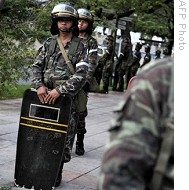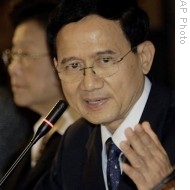VOA标准英语10月-Thai Public Calls for Talks to End Violence(在线收听)
 |
| Thai soldiers secure area outside Government House in Bangkok, 08 Oct 2008 |
A day after the worst political violence in Thailand in 16 years, the news media and political commentators are pressing the government to restart a dialogue with the opposition People's Alliance for Democracy.
Talks halted late last week after two PAD leaders were arrested for leading a blockade at the prime minister's office since late August.
On Tuesday, the police fought repeatedly with PAD supporters who surrounded the parliament building to prevent Prime Minister Somchai Wongsawat from delivering a speech. Mr. Somchai took office late last month and has pledged to reconcile with the PAD.
Hundreds were injured - receiving mostly minor wounds, but at least two deaths were linked to the violence. Several police officers were also injured.
On Wednesday, the city was quiet, and the PAD supporters had retreated from the parliament back to the prime minister's office.
Opposition demands investigation
The opposition Democrat Party says there should be an investigation into the violence. Buranaj Sumatharak is the party spokesman.
"The immediate demand must be that the government end the systematic crackdown using excessive force and violenceBuranaj said. "And secondly, those responsible for issuing orders and those responsible for carrying them out resulting in the use of excessive force must be found and held responsible."
Alleged political links fuel anger
The PAD has led protests for months, demanding an overhaul of the political system that would reduce the number of directly elected members of parliament.
 |
| Thailand's acting PM and deputy leader of the ruling People's Power Party, Somchai Wongsawat |
It accuses Mr. Somchai and his People's Power Party of acting as a proxy for former Prime Minister Thaksin Shinawatra. He fled to Britain in August to avoid trial on corruption charges. Mr. Somchai is the brother-in-law of Thaksin.
Thitinan Pongsudhirak, a political science professor at Chulalongkorn University, thinks the PAD must accept some responsibility for the violence.
"The reason that we have come to this point with the violence yesterday is because the PAD was being out-maneuvered," Thitinan said. "It looked as the Somchai government was finding some way out of the crisis - they were talking about dialogue - about setting up a new constitution drafting assembly and then the PAD took it upon themselves to take matters into its own hands to retake the initiative."
Will army play role in Thailand's future?
Some analysts, such as author and commentator, Chris Baker, say there may be a role for the head of the army, General Anupong Pajionda, in negotiating an end to the political crisis. Anupong has said he does not want the army involved and that he is concerned that some of the opposition might want to push the military into staging a coup.
"The key to what happen now is very much Anupong's attitude," Baker noted. "He must come out publically and to act as the host for negotiation between the two sides to get away this violent confrontation."
Thailand's political tensions during recent years have pitted the urban middle class, who accuse Mr. Thaksin of corruption and abuse of power, against the poor and rural voters who back the former leader.